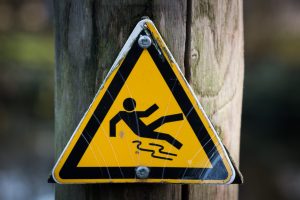 If you were hurt in a slip and fall on someone else’s property, whether you are able to recover damages will come down to the strength of the evidence you present. Every winning personal injury claim is supported by sufficient evidence of liability, causation, and damages.
If you were hurt in a slip and fall on someone else’s property, whether you are able to recover damages will come down to the strength of the evidence you present. Every winning personal injury claim is supported by sufficient evidence of liability, causation, and damages.
Some of the most valuable evidence for your claim was likely at the scene of the accident. If you overlooked anything, however, or if certain pieces of evidence were simply too difficult to obtain, a resourceful premises liability lawyer can help.
Let’s take a closer look at the kinds of evidence your legal team may gather to contribute to the strength of your slip and fall claim:
1. Proving Liability
Negligence is the foundation of most personal injury claims, including those involving slip and fall accidents. As such, proving liability comes down to proving negligence, which is the breach of the duty of care that one party owes to another. The specific duty of care owed to you will depend on your reason for being on the premises and whether you were there legally.
In order to recover a payout, you will have to prove precisely how the liable party failed to act with reasonable care. For example, was there an unmarked threshold that posed a tripping hazard? Or a spill that should have been wiped up promptly? An attorney can determine the duty of care that was owed to you at the time of the injury and whether it was in fact breached.
Evidence that could help you prove liability may include:
- Photographs of the hazard that caused you to slip and fall;
- Deposition from eyewitnesses;
- Building maintenance records;
- Documents detailing the establishment’s standard operating procedures;
- Surveillance footage of the accident; and
- The incident report.
2. Proving Causation
Your claim won’t have any chance of yielding a payout unless you can prove causation. In other words, how did the defendant’s negligence cause you to slip and fall, and how did the slip and fall cause your damages?
Once you’ve proven liability, proving causation may be fairly straightforward. If a causation dispute arises, your lawyer might counter such a dispute using your medical records, the deposition of your healthcare providers, eyewitness deposition, and photos of injuries.
3. Proving Damages
You must prove that you incurred actual damages in order to win your slip and fall claim. Michigan recognizes both economic and non-economic damages including medical bills, lost wages, pain and suffering, and loss of enjoyment in life. Evidence of damages may include relevant bills, receipts, invoices, detailed journal entries, and deposition from friends, loved ones, colleagues, and healthcare providers.
Call (248) 385-5704 for a Free Consultation with a Detroit Premises Liability Attorney
At Seva Law Firm, we are well-versed in all kinds of slip and fall scenarios. Our resourceful team of attorneys knows what it takes to build strong premises liability claims against negligent property owners and operators, and we’re not afraid to see every case through to the end, even if that means going to trial. Call (248) 385-5704 or use our Online Contact Form to set up a free consultation with a premises liability lawyer in Detroit.
